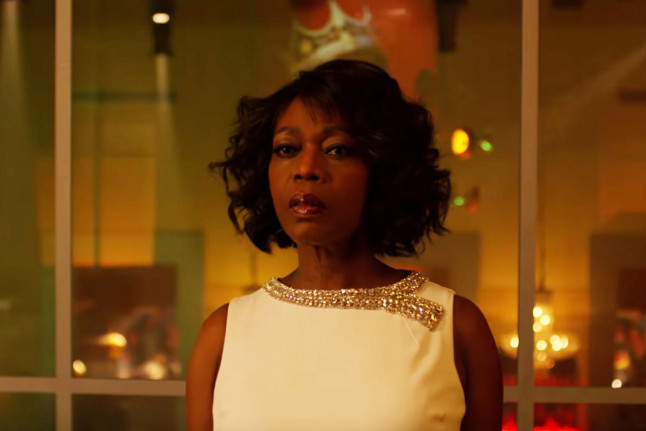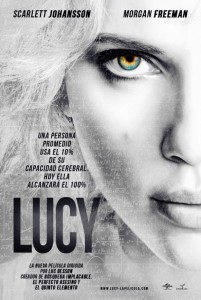As someone who watches very little television these days for various reasons, it’s always a relief when a show I enjoy makes its return. Personally, I consider Luke Cage second only to Daredevil in the Marvel Netflix show lineup. It’s got vibrant characters, a unique perspective, and some of the best friggin’ music short of a Tarantino movie.
So far, it seems that the second season has had a mixed reception. I understand why. Like last season, Misty made me want to slam her beautiful head into a wall into she got some gorram common sense, and there were just too many moments of characters doing needlessly stupid things. However, one thing I feel that Luke Cage’s 2nd season absolutely nailed was Mariah. I had already passively liked her in the first season where she was a background villain whose actions nudge her into the evil spotlight, so to speak. While I certainly missed Cornell, I feel that Mariah did a far better job as the Arc Villain than Diamondback. Plus, she presented a rather rare role: a black, older woman in a position of power in the middle of a sci-fi/superhero setting. Older black women are often pigeonholed as wise, grandmotherly caretakers in these settings, but Mariah pretty much busted most of the stereotypes related to women before her. She was (mostly) competent, motivated, and surprisingly threatening. Absolutely no one is surprised Alfre Woodard did a phenomenal job—she has long been hailed as one of the best actresses out there, and it was an absolute thrill to see her play a villain. I think in honor of her taking a spot in the pantheon of comic book villains, I should take a moment to explain why I love to hate this bad bitch.
Naturally, spoilers for the first two seasons of Luke Cage.
In the first season, it’s clear that Mariah wants to achieve her goals by any means necessary, but by keeping her hands clean and letting Cornell do the dirty work. Unlike other villains in the same genre, like say freaking Thanos, I actually believe her when she says she wants to help Harlem. Now, granted, I do think her “help” for the community is just her helping herself. Mariah has quite the ego and she loves being seen. She loves being the all-powerful matron, not unlike Mama Mabel Stokes, ironically. Mariah makes it clear that she is high horse enough to side eye Cornell’s methods, but she certainly doesn’t mind profiting off what he does. I especially like that Shades recognizes the slumbering predator in her shortly after he continues observing their interactions. Was it some heavy foreshadowing? Yeah, sure, but it shows off how perceptive Shades happens to be, since almost everyone had been underestimating Mariah right from the get go.
Cornell’s death sequence is honestly pretty incredible. It’s well-shot and most people admit it caught them right off guard. We all pretty much knew Cornell’s hair-trigger temper would likely be the cause of his death, but for it to be delivered by the often overlooked Mariah definitely sealed it as an excellent turn of events. What’s more is Shades’ reaction to Cornell’s death, and how Mariah in spite of her shock is able to function afterward with his guidance. You can practically see the eager glee in Shades when he sees the natural affinity for violence and power after she kills Cornell. He knows she’s something special and if anyone is going to be able to both defeat Luke Cage and get him out from under Diamondback’s control, it’s her. He hitches his wagon to her and they both go on to set themselves atop the hill at Harlem’s Paradise.
I remember watching the final moments of season one of Luke Cage when Mariah stalked on over to Shades and kissed him. I remember my eyebrows going up and saying, “Ohohoho! What’s all this then?” It was an unlikely development that I ended up weirdly interested in. First off, it’s not often an older black woman, especially not in a comic book setting, shows interest in a Hispanic man more than ten years younger than her. Second off, Shades’ reaction to the kiss pretty much solidified that they were going to become my new evil OTP. He was positively giddy that she kissed him. He was shooting heart eyes at her as she walked out and it was bizarrely compelling to me. I remember hoping that this wasn’t just a one-off grateful kiss and that the two of them would become their own version of Bonnie and Clyde.
Lo and behold, season two kicked off with Shades and Mariah in an actively sexual, romantic relationship. Like everyone else, I cringed when that poor, foolish waiter called him her nephew. Yikes. Talk about disproportionate retribution. That being said, Alfre Woodard said in an interview that she was supposed to do something else in the script, but she had the sudden idea to suck Theo Rossi’s thumb and I couldn’t have cackled louder at the end result. It was flawless. The amount of evil sass in that one gesture, and the fact that Alfre is the one who thought it up, and the fact that the showrunners loved it so much they kept it, is just the best. To bring the point home, I think Shades and Mariah’s symbiotic relationship was honestly the strongest, most human aspect of the 2nd season. I know, that’s odd to say, but I mean it. The two of them seem as if on paper they wouldn’t work, and while the relationship did have a ticking time bomb on it, I like that what ends it isn’t one of them killing the other. It’s Mariah’s derailment from a cold, distant matron into the vicious nature of a gangster, one so cold-blooded that it’s arguable if even Cornell would have gone as far as she did against Bushmaster.
Now, I get why other people wouldn’t be on the ship like I am because it is pretty strange, but that’s perhaps why I ended up liking it so damn much. It’s quite rare that older black women are treated as still sexually desirable at sixty, or hell, even as early in life as their forties. I love that Mariah macked on Shades with zero shame, and vice versa. I like even more that she wasn’t doing it to manipulate him into doing what she wanted—she genuinely reciprocated the attraction and seemed to be having a damn good time as his paramour. It’s a beautiful statement not to completely write women off because of their age. Mariah, for the most part, remained classy with how she brought it to Shades, and he was crazy about her up until things fell apart. The two of them weren’t courting just to find a place to stab each other back. They got along. They trusted each other. But once Mariah went into a full tilt ruthless gangster, Shades couldn’t handle that level of cruelty after having to shoot Comanche and almost losing Mariah to Bushmaster on top of that. Their priorities naturally shifted. He realized there was still some shred of a soul left in him, and losing Comanche as well as the remaining heart of Mariah pushed him too far.
A lot of fans are apparently crying OOC for Shades breaking up with Mariah and I disagree. I felt it was the natural progression. Shades did explain what the difference between him killing Candace and Mariah slaughtering Bushmaster’s entire family: that Candace willingly accepting the bribe made her guilty and made her subject to the same rules of all criminals, man and woman alike. She made a conscious decision to accept the bribe and lie on Luke Cage, and to Shades, that meant she was open season. In his opinion, Mariah murdering Bushmaster’s family, and the method in which she did it, was just too inhuman. She saw it as retaliation for what she lost, but hell, Bushmaster (foolishly) gave her a small window of a chance to survive instead of burning alive and spared her daughter. Mariah didn’t hesitate to kill those people, and even though they were by no means completely innocent, it still was an incredibly messed up thing to do. It was the straw that broke the camel’s back. He’d already put too many shackles on his soul and he couldn’t bear another link, especially not from the woman he loved.
The reason I find Mariah so interesting is her will power. I think that she has strength to just survive the worst sorts of things anyone ever could. Even with her being a selfish, evil gangster, I find myself admiring how she made it as far as she did before the end. What’s more is that she wasn’t implacable or perfect or one dimensional. I consider the scene of her in the wreckage of her brownstone with Shades to be the best acted scene of the entire season, and possibly in the show’s entire run. I really loved how Alfre and Theo played off each other here. I love how their conversation starts out accusatory and then gets heated, and then Shades pulls her out of that downward spiral. It felt natural, effortless, and moving, in a messed up sort of way, mind you. Shades built her up in a moment of weakness and reminded her of who she was so that she could continue on as the badass he knew her to be.
I think what Mariah represents is something I hope that other comic book properties and fiction at large take into consideration. Marvel has recently been tapping into the true power of black women, to my utter delight, and I like that we’re seeing representation in the realm of evil as well as good. Same with Ghost in the recent Ant Man sequel, it’s very satisfying for me as a geeky black girl to see my sisters out there in popular media kicking ass and not just being stereotyped as baby mamas or “exotic” love interests. It’s about damn time, if you ask me. The image that will always stick in my mind for Mariah is Shades holding her face in his hands and emphatically telling her, “You are a queen.” For as short of a reign that she had, I certainly enjoyed the hell out of Mariah’s dark influence over Harlem. She had a sharp tongue and a sense of purpose that I will certainly miss next season.
Here’s to you, evil queen.

